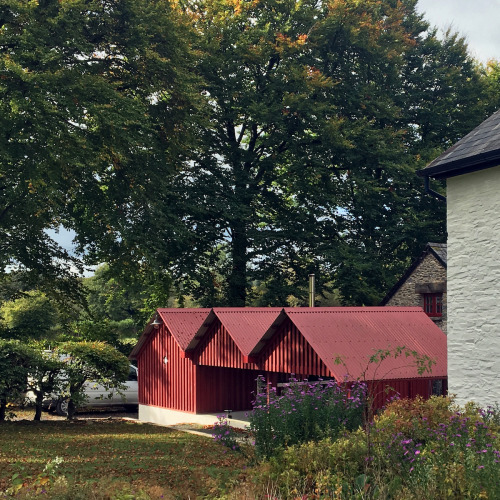


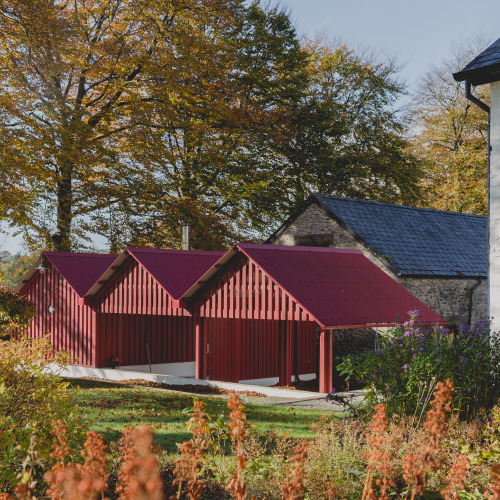




Rural Office for Architecture - Aeron Parc farmyard addition, Tregaron 2017. Photos © Whole Picture.
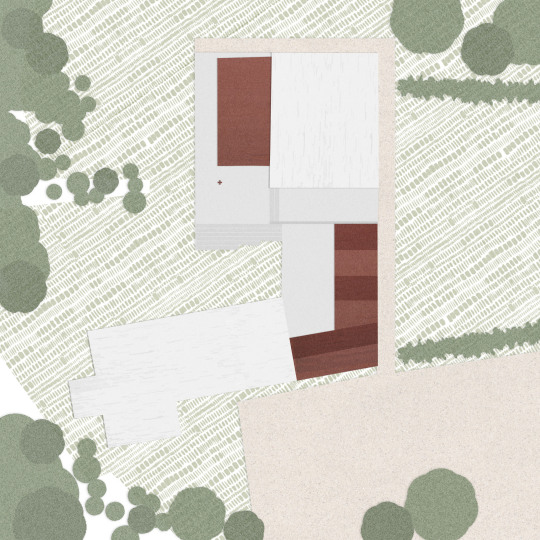









Rural Office for Architecture - Aeron Parc farmyard addition, Tregaron 2017. Photos © Whole Picture.




Around this time of year, there is often increased interest in supplements to boost the immune system. That has obviously never been more true than now, as most of the world is now under varying levels of lockdown, preoccupied with the growing threat of the novel coronavirus.
The idea of taking some kind of supplement to make the immune system stronger is understandably enticing, especially at a time like this. We are all stuck in an unprecedented situation, where we have little control. Many of us are longing for something to do, some way to protect ourselves. We naturally crave to take action. And there are plenty of products out there that offer to fill that void.
One supplement that often pops up in these discussions is elderberry.
Elderberry is a common name for various species of flowering plants belonging to the genus Sambucus. Parts of these plants have been used for thousands of years by Native Americans and people of the Mediterranean basin. Indeed, medicinal and dietary applications of elderberries date back at least to the Ancient Egyptians. But of course, medical practices in antiquity weren’t necessarily the state of the art. What does the research today tell us about elderberry?
Let’s take a look at what a recent meta-analysis revealed about this plant, and whether you should use it yourself.
Now, when a lot of us think of elderberries, this is probably the first thing that comes to mind. Or at least, it is for me.
Okay, but the second thing that likely occurs to you, with respect to elderberries, is a purported ability to “boost immunity.”
So, are these claims legit?
Well, it’s actually really difficult to answer this question! There are no large-scale studies testing the effects of elderberry extract or juice on immune function or disease symptoms in human subjects. And it’s not likely that any will be forthcoming, due to a pervasive lack of funding.
Instead, there is an overwhelming array of smaller studies testing various concoctions of elderberry, sometimes in human subjects but often in animal models or in cell cultures. It’s pretty hard to sort through this hodge-podge and get any unifying takeaways. When you factor in the piles of unpublished works, combing through the scientific literature becomes an even more daunting task.
Fortunately, some researchers endeavored to do all that hard work for us. A recent meta-analysis quantified the effects of elderberry supplementation on upper respiratory symptoms for the very first time, and it frankly could not be more timely. Let’s take a quick look.
In this analysis, the researchers narrowed their focus to randomized controlled clinical trials using human participants, with the primary outcome of interest being upper respiratory symptoms. Studies using primates or rodents or other critters were thrown out.
The researchers also limited their search to studies that used pure elderberry (either as a syrup or pill) as a primary intervention, without any other substances being used. It’s not uncommon for these sorts of studies to use a blend of ingredients, but you can imagine that adding other active constituents might make it tricky to tell if it’s the elderberry or if it’s something else.
The initial search revealed 137 studies. After evaluating these papers for inclusion criteria, a total of four studies were included in the meta-analysis. Yes, four. So, this evidence meets the highest standard of rigor, but there simply isn’t very much of it to work with.
These studies were generally pretty similar. They all randomly assigned participants to take either some form of elderberry extract or placebo, and then relied upon self-reporting instruments to measure upper respiratory symptoms. Symptoms were measured at baseline and at least once per day while symptoms were present. Total duration of upper respiratory symptoms were the outcomes being evaluated.
Just as an example, one of the papers tested the effects of a standardized elderberry extract supplement in economy class passengers traveling from Australia to an overseas destination. Cold episodes, cold duration and symptoms were noted in a daily diary, and participants also completed three surveys containing questions regarding upper respiratory symptoms just before travel and at 4-days after travel.
Effect sizes were calculated from the symptom duration and the severity post-test scores to conduct the analysis.
The final analysis included results from 89 participants in the elderberry groups, and 91 participants in the control groups, for a total of 180 participants.
The quantitative synthesis of the effects yielded a large mean effect size of 1.717 (SE=0.447; 95% CI: 0.840-2.593), p = <.001, using a random effects model.
Additionally, the moderator analysis found that elderberry supplementation reduces  upper respiratory symptoms from both viral infections, but was much more effective at reducing duration and severity of upper respiratory symptoms associated with influenza, rather than the common cold. However, this disparity should probably be taken with a grain of salt, since only one of the studies in the analysis looked at elderberry for common cold.
upper respiratory symptoms from both viral infections, but was much more effective at reducing duration and severity of upper respiratory symptoms associated with influenza, rather than the common cold. However, this disparity should probably be taken with a grain of salt, since only one of the studies in the analysis looked at elderberry for common cold.
So, the findings of this meta-analysis suggest that supplementation with elderberry may substantially reduce the duration of upper respiratory symptoms.
Sounds great! But before you start loading up on elderberries, there are a few things you need to keep in mind.
Elderberries must be properly prepared.
Making elderberry tea might not be the best DIY project.
The raw berries, flowers, bark, and other parts of Sambucus plants produce cyanogenic glycosides, which are hydrolyzed to hydrogen cyanide in the gastrointestinal tract. Yikes! Fortunately, the risk of toxicity is eliminated when the berries are exposed to heat,  combined with evaporation to release the dangerous compounds. So, if you insist upon using elderberries that you have grown or foraged yourself, make sure you have correctly identified the plant, removed any bark or leaves, and carefully cooked them.
combined with evaporation to release the dangerous compounds. So, if you insist upon using elderberries that you have grown or foraged yourself, make sure you have correctly identified the plant, removed any bark or leaves, and carefully cooked them.
Homemade formulas are also unlikely to achieve the potency found in commercial products. So the safest bet, in my opinion, is to leave it to the experts and stick to commercial preparations.
The actual content and efficacy of commercially available elderberry products may vary tremendously.
Yeah, about those commercial preparations…
So, as you probably already know, the content of supplements isn’t tightly regulated by the FDA. This means that it can often be hard to know if the pill that you are taking actually contains what the label claims. Elderberry is no exception to this phenomenon.
Furthermore, there does not appear to be a standardized method for measuring the number of bioactive components, like anthocyanins, in these sorts of products. One study showed that a supplement could claim to contain 762 mg/L but really only contain 4 mg/L, depending on the method used to measure anthocyanins. Therefore, determining the effects of currently available products may be difficult.
So what can you do? When you buy any supplement, including but not limited to elderberry, you need to look for products that have been verified by independent organizations, like NSF or USP. Just as one example, the brand Nature Made is extremely easy to find in stores in the US (you can even get it at Wal-Mart), and the USP verified mark appears on most its products.
You can also consult ConsumerLab.com, which lab-tests supplements and publishes results on their website. In their report for elderberry, they found that doses of anthocyanosides in elderberry products varied immensely, by as much as 2000-fold. So again, it’s worth it to do your research and be picky here.
The quality of data related to elderberry is overall not very strong – but there is probably no harm in taking it.
Here’s what we know: A few small, industry-funded, randomized controlled trials show that supplementation with a standardized elderberry extract appears to significantly reduce total duration and severity of upper respiratory symptoms associated with influenza.
There isn’t really strong evidence suggesting that they can prevent infection in the first place, though there is some interesting preliminary research suggesting that compounds in elderberry may generally improve the function of the immune system in response to infectious threats.
As is often the case in biology, there are still a lot more questions than answers.
And finally, I must emphasize that most of the studies that we do have are testing elderberry extract in relation to symptoms associated with influenza. We have no idea whether any of this would apply specifically to SARS-CoV-2. We do know our cells respond quite differently to the virus that causes COVID-19, compared to other respiratory illnesses.
Taking elderberry extract, or any other supplement for that matter, should never replace vaccination, proper hygiene (wash your hands people!), behavioral measures like social distancing, or medical advice from your doctor. Hopefully, I am stating the obvious here.
However, taking a standardized elderberry supplement is unlikely to be harmful, and may help a bit with shortening illness. If you’ve already got all of your ducks in a row from a health standpoint (think sleep, exercise, nutrition, that kind of thing), I wouldn’t see a problem with adding in a supplement like this.
The post Does Elderberry Boost Your Immune System? appeared first on humanOS.me.

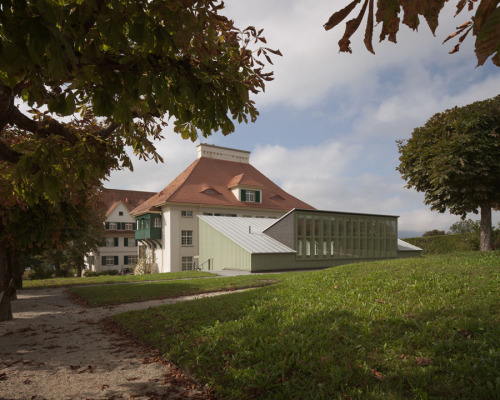
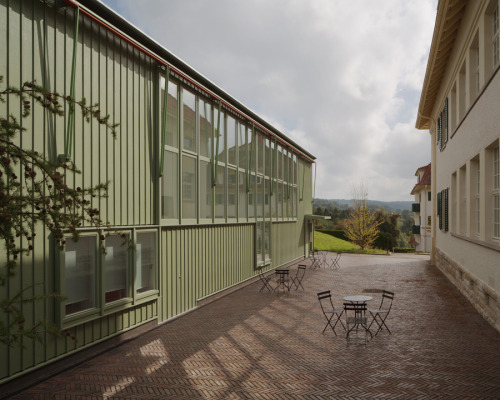







Romero Schaefle - Renovation and extension of a health clinic, Hohenegg 2011. Photos © Georg Aerni, Karin Gauch, Fabien Schwartz.



















Käferstein & Meister - Apartment building, Zürich 2015. Constructed for a client who is a master builder, and subject of a recent publication on Quart Verlag. Via, photos © Ariel Huber.


